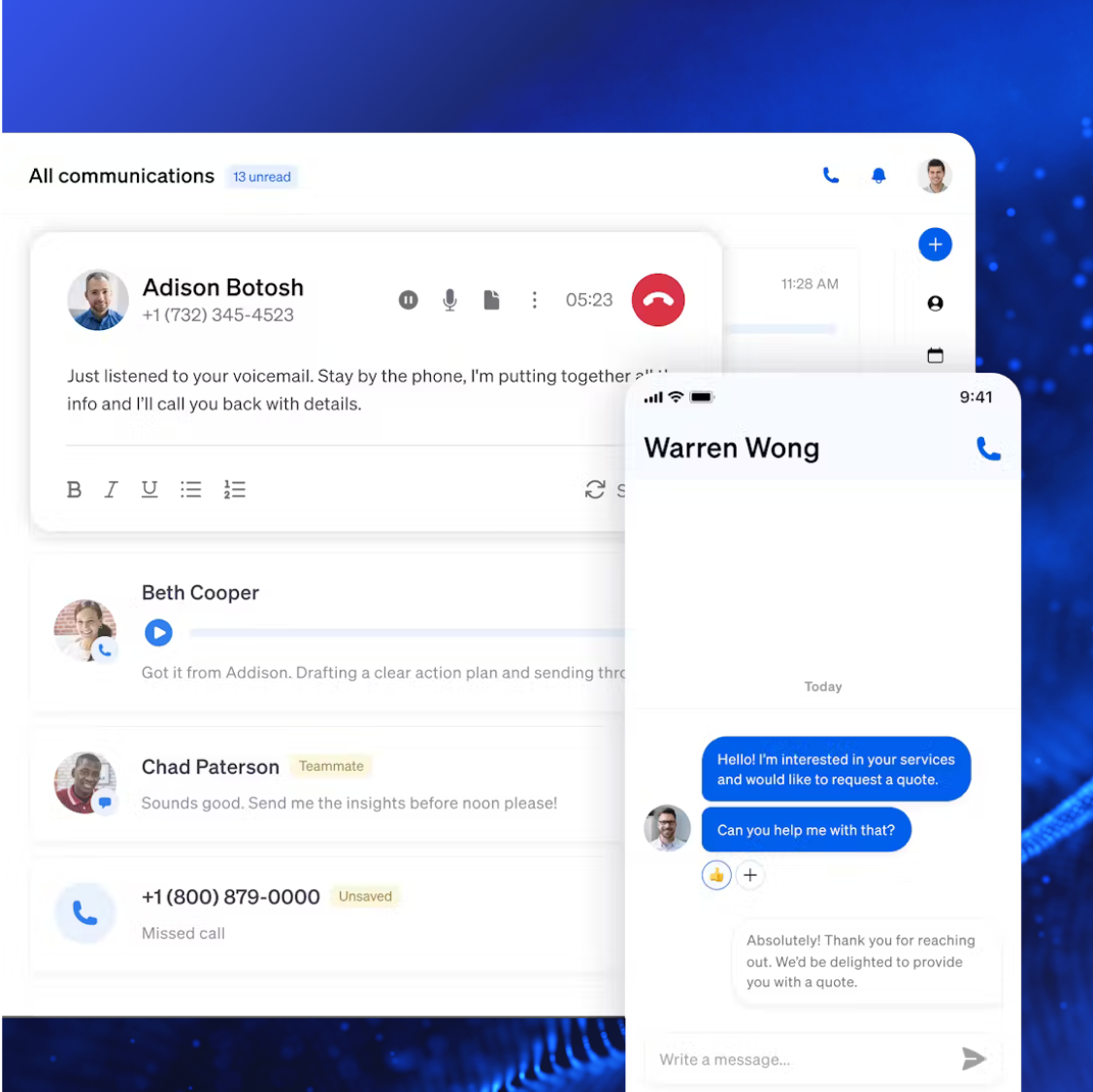Outsourcing contact center operations can be appealing, especially as contact center as a service (CCaaS) options have become increasingly common. That said, it’s important to go into outsourcing with a good understanding of what challenges may arise alongside the benefits and to pay close attention to potential drawbacks, including how they could impact your brand reputation.
What Is Contact Center Outsourcing?
Contact center outsourcing is a specific type of business process outsourcing in which a company hires a service provider to handle its inbound and outbound communications. Cloud-based call center software to allow remote agents located worldwide to do the following:
- Make and receive phone calls with impressive call quality.
- Integrate with the brand’s CRM to access data on past customer engagement for personalized support.
- Leverage company knowledge bases, call scripts, and support policies.
- Deliver omnichannel support, including SMS, video, email, and social media.
Support agents can help with customer interactions through inbound and outbound calls, including providing tech support, lead generation, order processing, and customer service resolution. Some also help with promotional outreach, feedback collection, and market research.
Why contact centers are increasingly turning to CCaaS solutions
Customer care leaders are facing increased customer service expectations. According to research from McKinsey & Company, many are concerned with enhancing the customer experience and improving overall operations, tech, and revenue generation. CCaaS solutions can help with each of these priorities, leveraging secure, reliable technology to improve the customer experience, operations, and revenue.

It’s also important to note that while call centers may exclusively handle phone calls, contact centers typically handle multiple communication platforms. The same study found that customers are increasingly accepting of non-phone channels, but phone calls are still valued across all customer demographics.

Advantages of Outsourcing Your Contact Center
There are plenty of upsides that can come with outsourcing customer service to a contact center. Let’s discuss how outsourcing contact center operations may help you meet your current business goals.
Cost reduction
Outsourcing customer support to a contact center can lead to significant cost savings in the following areas:
- Infrastructure: You can avoid paying for significant infrastructure, including office space and equipment, especially since many contact centers rely on cost-effective VoIP systems.
- Staffing: Outsourcing customer support is often more cost-effective than having internal employees handle it, especially when you want round-the-clock support that extends to late nights and holidays.
- Training: There’s no need to onboard and train new employees; simply find a strong contact center partner and provide guidance with call scripts and brand policies that detail how they should handle inbound and outbound calls.
Scalability
Using outsourced call center services is one of the simplest ways to manage fluctuating call volumes. Contact centers can easily adjust agent numbers to address demand fluctuations. Many contact centers offer pricing based on usage, so you scale up and down without having to hire, train, and potentially lay off internal team members when call volumes shift.
Both outbound and inbound contact centers may offer omnichannel customer service to help you scale communications across multiple platforms. The best outsourcing solutions offer high-quality service alongside scalability to increase customer retention.

Expertise
If you want to improve the customer experience, tapping into a contact center’s wide talent pool of agents is a great way to go. The best contact center services work with experienced, highly trained agents who may have specialized skills in areas such as marketing, problem resolution, technical support, and account management to help meet your specific business needs.
24/7 support
Contact centers can truly provide global coverage with round-the-clock services across multiple time zones.
Customer calls requesting urgent tech support or help with emergency situations don’t stop just because your main offices are closed, and outsourced support can help you meet those customer needs much more effectively. This, in turn, can increase your customer satisfaction (CSAT) scores and overall customer engagement.
Downsides of Outsourcing Your Contact Center
There are several risks to consider when it comes to call center outsourcing services. While these can be minimized by choosing reliable contact centers, it’s important to consider whether they outweigh the advantages for your business.
Quality control
Many businesses outsource customer support to third-party services to improve the customer experience, but you do lose some control when relying on an outsourcing partner for customer care. So when you’re outsourcing to another support team, carefully track customer engagement metrics and KPIs to ensure that your standard service levels are met.

Data security
Your business is responsible for maintaining data security best practices, including following any local or industry regulations. Some call center solutions do prioritize data security and privacy policies, but it can be difficult to ensure that secure data handling practices are in place with third-party providers and any software they use.
Limited oversight
When outsourcing customer support to a contact center, your business has less direct oversight of day-to-day operations. A trusted and transparent contact center partnership can be an asset and save you time, but it can prevent you from identifying potential trends in customer complaints or concerns. This makes ongoing reporting, recorded call analysis, and performance monitoring essential.
How to Get Started & Best Practices
When your business decides to find and hire a contact center, the following approach can help you choose the one that best meets your business’s and your customers’ needs.
Evaluate your in-house operations
Review your existing in-house customer support operations, considering current performance and projected goals, to determine outsourcing feasibility.
Look for potential areas for improvement. Is your customer support team struggling to help with certain customer needs, like technical support? Or does call volume fluctuate so significantly that you struggle to maintain appropriate staffing levels?
Develop a cloud contact center strategy
When choosing a contact center partner, it’s important to know what specific services you want to outsource.
For example, many businesses keep some internal customer support team members on hand to manage high-level concerns. Some choose to outsource all inbound calls but handle all outbound calls themselves. Others, however, may choose to outsource all calls to a contact center, with the option to escalate specific customer interactions to internal team members.
Determine the strategy you’ll use to improve the customer experience through the contact center.
Narrow down your requirements
Once you know how you want to leverage a contact center and what sort of services you’re interested in, it’s time to focus on the details.
Outline key requirements, desired features, and preferred methods for evaluating the different contact centers. These may include:
- Automatic call recording, with the option to manually disable recordings during phone calls to protect sensitive client information, including payment details.
- Security certifications or clearly documented security and data privacy policies.
- Transparent performance monitoring.
- Specific services, including lead generation, order and payment processing, customer concern resolution, and technical support.
- Omnichannel support platforms, including phone, video, live chat, and social media.
- Fast response times and call routing to help customers reach specialized support agents.
- Agents who are exclusively located in the same country as your business rather than offshore call centers.
- Relevant experience and specialized services based on your industry.
Short-list potential contact center software
Review different contact center software providers, and identify a few top contenders based on their capabilities, services, client reviews, and industry experience. Reach out to their sales teams to get detailed information about services, internal policies, and reporting transparency.
Conduct due diligence
The top call center outsourcing companies typically offer case studies, online client testimonials, and customers who are willing to speak as references.
It’s crucial to conduct due diligence before officially selecting a provider. Confirm that everything you heard from the sales team was correct by researching past performance, client references, security practices, and any communication or data privacy policies they’ll share.
When considering client reviews, it’s important to look for ones that were written in the past year, as some contact centers’ performance may improve or deteriorate over time.

Negotiate and finalize contracts
Determine pricing and policies, and ensure that the services and call volume you’re receiving will be in line with your needs and budget. Consider both immediate and long-term needs to make sure the contact center can scale up and down alongside your business as required.
Onboard & train workers
The best contact centers work closely with your business to learn about your brand, products, services, and customers. Onboarding and training typically include the following processes:
- Connecting to the chosen contact center software and providing training for internal and external team members.
- Creating documented customer support policies.
- Providing the partner with call scripts, access to relevant CRM data, and navigational call flows.
- Adjusting call routing to accommodate the addition of the contact center, directing all calls to the appropriate departments.
- Setting up performance tracking practices.
Collaborate closely with the provider to ensure a smooth transition.
Continually monitor & make improvements
Regularly review performance metrics and make adjustments as needed. Track metrics like first call resolution rate, occupancy rate, and average speed of answer to ensure that customers are receiving prompt and thorough assistance and that the agency is as responsive as promised.
It’s also important to track customer engagement metrics like net promoter scores, CSAT scores, and customer effort scores, which can tell you more about how happy customers were with their support experience and how it may impact your brand reputation or business growth.

How a CCaaS Platform Improves Outsourcing
CCaaS providers are cloud-based contact center solutions that offer expansive features designed to streamline customer support for call center partners and the businesses that hire them. As a result, these providers offer multiple key benefits.
Simplified infrastructure
There’s no need to set up or maintain physical servers and equipment for your outsourced team. They can access the communication platform remotely from anywhere in the world as long as they have an internet connection.
Related: Contact Center Infrastructure Software: What’s Under the Hood?
Reduced costs
The elimination of up-front hardware and software investments provides instant cost savings for your company, allowing you to invest in other areas of your business.
Scalability & flexibility
Cloud platforms let you easily add or remove agents as needed, efficiently adapting to fluctuating contact volume for your outsourced partner. Since call center operations often involve significant variations in call volume, this flexibility is invaluable.
Unified platform
CCaaS solutions offer a single, centralized platform for all communication channels, including voice, email, video, and live chat. This can streamline training and agent workflow for both your internal and outsourced teams and significantly improve the customer experience overall.

Personalized & improved customer experience
Unified platforms that connect to your business’s CRMs allow both internal and external support agents to best serve each individual customer. Agents can view past customer interactions, purchase history, and specific calls regarding the current concern to build stronger customer relationships.
Automation through auto attendants and smart call routing can quickly connect customers with the right agents, reducing waiting times, call transfers, and customer frustration.
Real-time collaboration
Cloud platforms facilitate seamless information sharing and collaboration between your team and the outsourced contact center, improving communication and efficiency. They also promote transparency, so you can feel confident about the level of service your customers are receiving.
Performance monitoring & reporting
Gain real-time insights into agent performance, call quality, and customer satisfaction metrics across the entire operation (including outsourced agents).
Security & compliance
Cloud providers typically handle data security and infrastructure maintenance, ensuring adherence to industry regulations.
Businesses in restricted industries can look for contact center solutions that offer relevant security policies. For example, Nextiva offers dedicated security and data privacy features for automatic HIPAA compliance for health care contact centers.
Supercharge Your Contact Center Operations With Nextiva
There are both pros and cons to outsourcing your customer service business function to a third party, and it’s important to consider the advantages and disadvantages equally.
While there are risks of loss of quality control, data security, and oversight, choosing a trusted partner and a strong contact center solution can also offer benefits like increased scalability, significant cost savings, and an improved customer experience.
Regardless of whether you decide to outsource additional support to a third party, Nextiva has the platform to make contact center operations a breeze. Learn more about how Nextiva’s AI-powered contact center solutions can help you provide omnichannel, personalized support to every customer who gets in touch.
Your AI-powered contact center.
All conversations in one platform: Empowering agents, satisfying customers.















 Customer Experience
Customer Experience 









